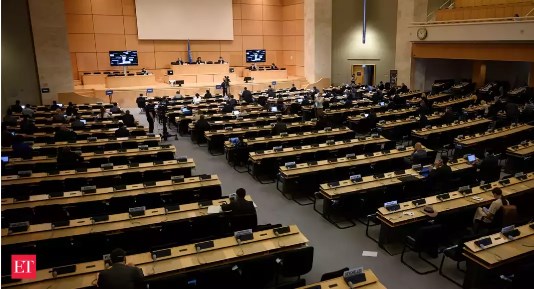
Wednesday October 14, 2020

Saudi Arabia lost a bid to keep its seat on the 47-member United Nations Human Rights Council, the body which describes itself as being tasked with "promoting and protecting all human rights around the globe."
The development after the kingdom's two consecutive terms on the council, some analysts say, demonstrates the deterioration of its image on the world stage following high profile human rights scandals including the murder of Saudi journalist Jamal Khashoggi and the detention of several women's rights activists.
While some human rights groups have praised the move, many condemn the UNHRC's vote to include China, Russia and Cuba, well known for crushing dissidents, arbitrary arrests and executions, and in the case of China, the detention and oppression of some 1 million Muslim Uighurs in "re-education camps" in the country's West.
Elected directly by secret ballot by a majority of the U.N. General Assembly, the vote has for years been criticized as being plagued by corruption and back-door deals. Among the criticism is that membership is divided among geographic groups, mandating a certain number of members per region and enabling several states to run for seats uncontested.
Among the U.N.'s five designated regional groups, the allocations goes as follows: African states, 13 seats; Asia-Pacific states, 13 seats; Eastern European states, 6 seats; Latin American and Caribbean states, 8 seats; and Western European and other states, 7 seats.
Saudi Arabia held onto its seat for a second term in 2016 when Asia put forward only four candidates for its four open seats on the council, meaning they all ran uncontested. This year, there were five states running for four contested seats. The four winners for the region were China, Pakistan, Uzbekistan and Nepal — all of whom are criticized for their human rights records.
Independent monitoring group UN Watch, based in Geneva, described allowing China, Russia, Cuba, Pakistan and Saudi Arabia to serve on the UNHRC as akin to "making a gang of arsonists into the fire brigade."
Vision 2030 and 'image on the world stage'
The kingdom's image is a crucial part of its bid to attract investment for Crown Prince Mohammed bin Salman's ambitious Vision 2030 reform program aimed at diversifying the Saudi economy, says Torbjorn Soltvedt, principal MENA analyst at risk consultancy Verisk Maplecroft, who described a lack of investor enthusiasm as a "main concern."
"Although plans to transform the Saudi economy still captures the attention of investors around the world, translating this interest into concrete investments will require a big effort to improve Saudi Arabia's image on the world stage," Soltvedt told CNBC. "Without international investors there can be no Vision 2030."
Rights advocates also condemn Riyadh's bombing campaign over Yemen, which has led to what the U.N. called the world's worst humanitarian crisis — though that did not stop the kingdom from being re-elected to the council in 2016, nor did it dissuade investors from flocking to its inaugural "Davos in the Desert" investment conference in 2017.
Sliding into 'isolation' or increasing its clout?
"Under Saudi Arabia's Crown Prince Mohammed bin Salman, the monarchy continues its downward slide into global isolation and irrelevance," Sunjeev Bery, executive director of American foreign policy advocacy group Freedom Forward, said in a statement. The group has managed to successfully convince the mayors of New York, London, Paris and Los Angeles to boycott Riyadh's hosting of this year's G-20 economic summit in November.
The Saudi Foreign Ministry and the U.N. office in Saudi Arabia did not reply to requests for comment at time of publication.
Sarah Leah Whitson, executive director of Democracy for the Arab World Now, the organization founded by friends of the slain Jamal Khashoggi, reacted to the U.N. vote: "It is telling just how badly Crown Prince Mohammed bin Salman has damaged his country's global standing for Saudi lost its election to the UN Human Rights Council while China and Russia managed to win seats."
While admitting that Saudi government agents carried out Khashoggi's killing in the Turkish consulate in Istanbul in October of 2018, Riyadh strongly denies any involvement by the crown prince, who was allegedly implicated in CIA findings.
The claim that the Saudi monarchy is "sliding into … irrelevance," however, doesn't entirely manifest itself in current affairs. Saudi Arabia will be hosting the G-20 for the first time in November, has expanded its relations with China and Russia, its Public Investment Fund has invested billions into global corporations, and it has managed to woo some of the world's wealthiest investors and bankers to its high-profile financial conferences and ambitious development projects — all despite its well-known rights record.
Created by the General Assembly in 2006, the UNHRC is meant to examine human rights issues, make recommendations and establish international inquiries and fact-finding missions.